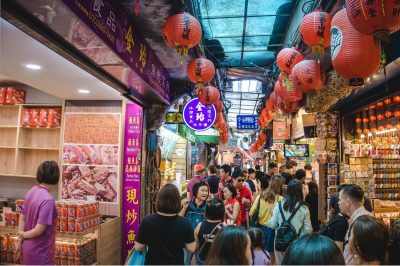Can you bargain for goods when visiting Taiwan? This is a question many travelers ask, wondering if the rules here are the same when it comes to hitting the other markets and shops in East Asia. In a general sense, yes it is – with some savvy negotiation skills you can score a deal on many things. That said, Taiwan is an island with its own distinct culture and as such the bargaining game needs tweaking to account for the nuances. So before you make landfall and prepare to channel your inner shopaholic give the following a read first.
7 Tips for Foreign Travelers When Bargaining for Goods and Services in Taiwan
1. Learn a Little (Taiwanese) Mandarin
While basic English is a common tongue spoken between visitors and market vendors / shop owners, you’re more likely to pay full price when you exhibit no knowledge of the local dialect. Some of you will have done some homework in Mandarin Chinese, and that can help, but it just indicates that you’ve spent some time on Mainland China, and not on the island. By learning a few words in Taiwanese Mandarin you will show vendors that you have been here before (even if you haven’t) and that you know that a price tag is just a sticker and not a binding contract.
Taiwanese Mandarin is a variant of the standard Mandarin, with pronunciation varying in terms of tone. Watch a few YouTube tutorials on Taiwanese Mandarin pronunciation and then apply what you’ve learned to the following (or more):
- Duōshǎo qián? = What is the price?
- Tài gulle = Too expensive
- Dànshì nà tài guì le = But that’s far too expensive
2. Bundle for a Bargain
Unlike many other East and South East Asia markets you won’t automatically score a discount when showing some staunch negotiating skill. Many Taiwanese vendors will stick to the sticker price if you’re looking to buy one single thing, especially if that item is a popular one. You’ll have a much better shot a bringing down the price by finding other things on the table or shelf that you want, and offering a reduced price for the bundle.
3. Be Confident But Not Rude
You will want to present your offer or request to reduce the price with replete confidence, but don’t confuse confidence with being curt or rude. The latter won’t fly in Taiwan, and foreigners will be sent packing from a market without a deal to be found. Smile, hold the item and cash (New Taiwan Dollar NT$) in hand and decisively state the price you will pay, assuming it’s reasonable (more on this below), and the vendor will be more likely to accept.
4. Be Reasonable with Discount Demands
Every day ain’t Black Friday (U.S., etc.) or Boxing Day (Canada, etc.) so don’t throw around demands for 50% off or BoGo deals. You won’t be taken seriously if you do, and you will quickly lose bargaining power in Taiwan. Negotiations for 10-20% fare much better, but state it in hard dollars terms (do the math in your head first) to make it easier for the vendor to accept.
5. Build Relationships to Reduce and Repeat
People in Taiwan are friendly, accommodating and appreciate travelers that show respect for the local people and culture, even in the at-times hectic market environment. This gives you the opportunity to develop relationships with local vendors when staying for a few days or longer. The longer this relationship lasts, the greater your discounts will be, so set a positive tone for negotiation from the get-go and shop more often versus loading up all at once. For example, if you will be in a given city or town for a week and you find a vendor offering a variety of goods that you are interested in, buy a few small items (remember to bundle!) at a small discount. Remember to be friendly and most of all memorable, which can be accomplished by cracking a joke or asking them to take a photo with you (etc.). Once that rapport is established, return the next day for another purchase, this time asking for another slight larger discount such as 15% vs 10% and indicate that you will keep coming back to them during your stay. Repeat this process while remaining friendly and genuine throughout.
6. Knowing Where and Where Not to Bargain
Taiwan’s famous night (and day) markets are prime for bargaining so feel free to exercise everything above when visiting these shopping destinations. Many smaller boutique shops and mom & pop electronic stores/kiosks with competition nearby will be open to negotiation too, so feel free to ask. The worst that can happen is a shop owner will say “no”, so no harm or foul. However, don’t expect any success when asking for discounts at traditional shopping malls and franchise/chain stores that you find across the island, Asia, and/or the world. The clerk in H&M Top City Taichung will give you rolled-eyes followed by a blank stare if you ask for a unadvertised free pair of leggings to go with your scoop neck crop fitted top.
7. Shop With a Local Guide
Without a doubt the best way to get a bargain when shopping in Taiwan is to roll to the market and shopping district with a local guide. When you connect to one of Loci Amica’s Taiwanese guides you will gain a friend who will stand at your side when stepping up to the bargaining table, and can employ the above tactics better that you could on your own, along with a few others that only locals can pull off successfully. Vendors and shopkeepers will immediately note that they are local, assume that the two of you are lifelong pals, and will drop prices faster than a hot Gua bao. Book the tour to get started.







